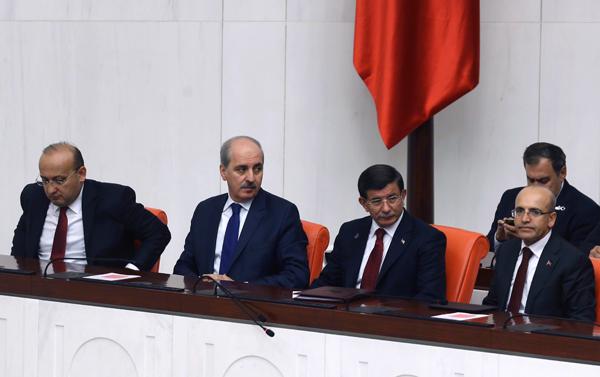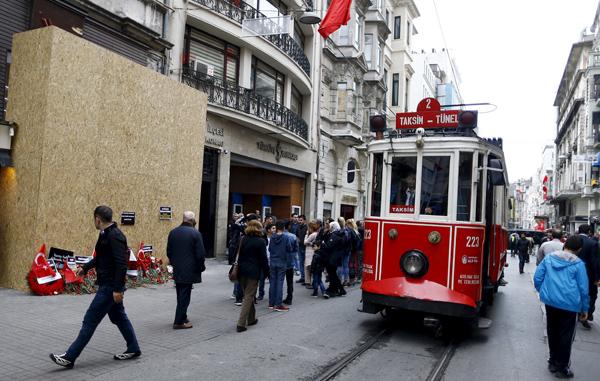You are here
Turkish central bank chief tries to sidestep Erdogan pressure
By Reuters - Mar 09,2015 - Last updated at Mar 09,2015
ISTANBUL — Turkish Central Bank Governor Erdem Basci, a technocrat reluctantly thrust into a standoff with President Recep Tayyip Erdogan, appears to believe he will eventually ride out the storm.
In his shoes, many bank chiefs might already have quit. Erdogan's relentless demands for sharper interest rate cuts, his assertion that the bank is under outside influence, and his equating of high rates with treason have left Basci struggling to restore investors' confidence.
Yet those close to the former professor, who is respected on financial markets for his command of economic theory, say he is optimistic that Erdogan's rhetoric is little more than populist theatre before a parliamentary election in June.
While reluctant to talk politics even in private, Basci has made clear he does not plan to stand down, saying last month that a public duty must be performed for the full period in which it is assigned.
Economic growth, a pillar of the ruling AK Party's electoral strength over the past decade, is flagging. Industrial production fell more than two per cent in January, data showed on Monday, adding weight to Erdogan's case against Basci.
"He is cornered," said Selin Sayek Boke, deputy chairwoman of the main opposition CHP, who, like Basci, taught economics at Ankara's Bilkent University.
"If he resigns he is going to be blamed for bringing havoc to the financial markets. If he does not resign, he will be blamed [for stalling growth]," she adeed.
A meeting expected in the coming days between Basci, Erdogan, Prime Minister Ahmet Davutoglu and Deputy Prime Minister Ali Babacan, in charge of the economy and a close Basci ally, could be crucial.
When the central bank lowered its main rate in January to 7.75 per cent, government ministers immediately said the 50 basis point cut was not enough to support growth.
But with the lira tumbling to record lows last week and inflation stubbornly above target, Basci is likely to try to persuade Erdogan of the need to keep monetary policy tight.
"I think Basci is living under an illusion. He's still not resigning. He's assuming Erdogan can be persuaded and the tension can be eased after the parliamentary election," said one source familiar with the thinking inside the central bank.
Others in the institution fear Erdogan's statements will only intensify and "spin out of control".
"[Some] think this is a political manoeuvre by which Erdogan aims to put the blame for the deterioration in growth and rising inflation on somebody else, and claim that the economy got worse because they didn't listen to him," the source added.
‘Creative technician’
Basci's fate is seen as closely tied to that of Babacan, a top figure in Turkey's economic management team for more than a decade and respected by foreign investors.
The two were childhood friends, their fathers were both small business owners in Cikrikcilar, a neighbourhood of artisanal workshops and traders in Ankara's old town. They went on to study together at the city's Middle East Technical University.
"Basci is a smart man who's well aware of what's going on. But the reason he's remaining in office is his personal relations with Babacan," said Ugur Gurses, a former central banker and newspaper columnist.
"He thinks that Babacan will have to endure the consequences of his resignation and he's resisting until the end to avoid this," he told Reuters.
Unable to raise rates because of the political pressure, Basci has been trying to support the lira by other means, on Monday cutting foreign exchange deposit rates, the bank's third back-door attempt since last week to prop up the currency.
"[Basci] has been a creative technician... He tried to please the markets together with the politicians," said the CHP's Boke.
His hands had been tied, she added, by the government's failure to undertake structural reforms to reduce a large current account deficit that has left Turkey dependent on volatile foreign capital flows.
"If they want to avoid the depreciation, they're going to have to hike interest rates... We're an open economy, we haven't resolved our structural issues and clearly we need foreign financing," Boke indicated.
Davutoglu and Babacan spent much of last week in New York, trying to reassure investors that the outlook for Turkey was bright despite the row over monetary policy.
One bank strategist briefed by colleagues said the delegation had emphasised that there would be no "aggressive reshuffle" of the economic team before June.
But after the election, things will be less certain, particularly if Erdogan pursues his battle against the "Cemaat" network of US-based cleric Fethullah Gulen, an ally-turned-foe whom he accuses of plotting against him through influence in state institutions.
"The central bank and the Treasury are the last fortresses of the Cemaat. A considerable number of people think Basci remains in office due to their support," said the source familiar with central bank thinking. "What kind of steps will be taken for these institutions will be clear after the elections."
Related Articles
ISTANBUL — As a onetime Wall Street banker and former finance minister, Turkey's new economy tsar Mehmet Simsek is widely seen as a proponen
From the outside, it looks like any other automatic bank machine on the streets of Istanbul. But rather than notes, this one distributes small pieces of gold.
ISTANBUL — Six suicide attacks in eight months and a spat with Russia have added to concerns for the Turkish economy as tourists flee, takin
















